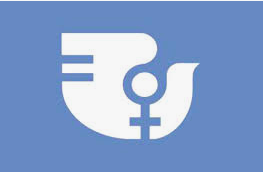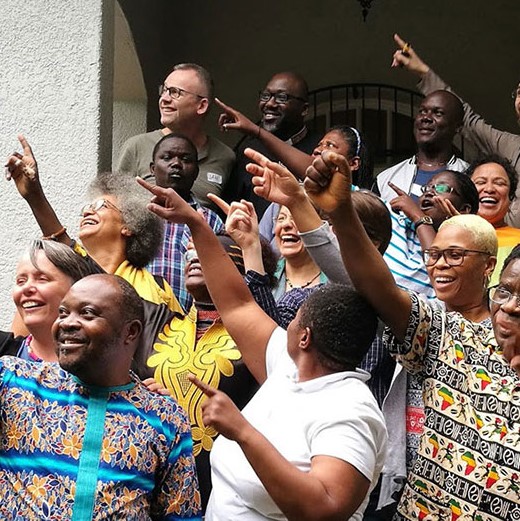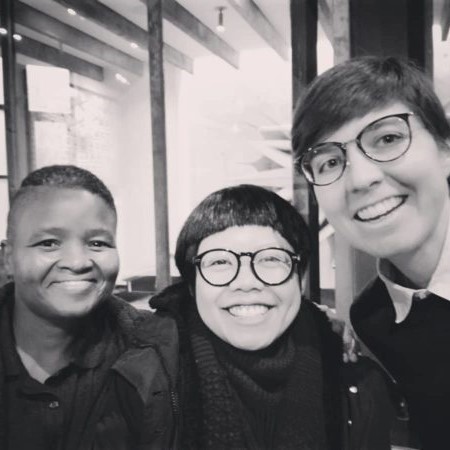United Nations Commission on the Status of Women
LBTI Caucus Statement in Response to the Covid-19 Pandemic, March 2020
The Lesbian, Bisexual, Trans, and Intersex (LBTI) Caucus is an informal group of over 300 representatives covering every region of the world, which participates in the UN Commission on the Status of Women to ensure that the voices of LBTI women are heard and included in its annual recommendations. GIN-SSOGIE has been participating actively at CSW, as part of the LBTI Caucus since 2017, also to promote interfaith matters. Past activities include the co-organization of side events, including one on “Reclaiming Faith and Family by the LGBTIQ Community: the Ethics of Reciprocity Project” during the 2017 session, with Ymania Brown and Yvette Abrahams as keynote speakers, and the International Fellowship of Reconciliation as partner organization.
This year, due to the COVID pandemic, CSW64 was cancelled. GIN-SSOGIE had planned several activities including a side event on Diverse Family Models, partnering with Outright International and the delegation of the European Union. We hope to continue our advocacy including on the recognition of diverse family models in the 2021 session and other international human rights fora, including at the UN in Geneva, during upcoming Human Rights Council sessions in 2020.
As part of our advocacy efforts this year, we have contributed to the drafting of the CSW LBTI Statement on responding to the Covid-19 crisis, urging governments to promote and protect the rights of all, including the most marginalised people. Here it is below:
Introduction
The current public health crisis caused by the spread of the Coronavirus, Covid-19, is a global emergency with far-reaching social, economic, and ecological implications for us all. The way that this crisis is handled will have pervasive and long-lasting impacts on our communities and the planet.
Collective action taken by individuals, such as social distancing and good hygiene, are effective and necessary tactics that recognize the need for a community response and an approach based on global solidarity. However, immediate and large-scale measures, often punitively backed by states to control the Covid-19 pandemic, coupled with high stress on public services, will have disproportionate implications on those who face multiple and intersecting forms of marginalization, including lesbian, bisexual, transgender, intersex (LBTI), and gender non-conforming (GNC) women and people.
Impacts on Health and Access to Healthcare Services
LBTI and GNC people suffer from higher rates of underlying health conditions than the general public, which have shown to exacerbate the morbidity and mortality rate of those contracting Covid-19. These include, but are not limited to, diabetes and other non- communicable diseases, which in some regions like the Pacific are in epidemic proportions, heart disease, cancer, respiratory problems associated with smoking, and compromised immune systems from chronic diseases like HIV. All of this is compounded by inadequate public healthcare systems, stigma, discrimination in accessing healthcare and by healthcare workers, lack of health insurance coverage, and other barriers to accessing health resources. LBTI and GNC people also suffer from high rates of mental health issues, including depression and anxiety, high rates of suicidal ideation, attempts, and completions, which may be aggravated by situations of worry, stigma, family harassment, ill-health, and confinement.
Worryingly, those who have chronic or other conditions in need of treatment, or who need routine medical care, may find it harder to access medication and medical support, especially in countries which have gone into lockdown, and where access to public and other services are halted. These situations will be heightened due to restrictions on movement and interruptions in public transportation services. Transgender and intersex individuals, who may seek or have particular health needs, such as access to hormonal treatments or gender affirming services, may also face additional barriers, if not a complete inability, to access services due to the pressure on hospitals and medical practitioners to address Covid-19. Of grave concern are older LBTI and GNC people who fall under multiple risk categories, are more susceptible to suffer mortality from contracting the virus, and may not have access to financial security, basic healthcare, or family and support systems to rely on.
This crisis highlights the fundamental need for universal healthcare, social floor, social protection and access to justice. This is especially pertinent when considering the specific impacts of such a pandemic on LBTI and GNC people and other marginalized groups. Governments must take all necessary measures to protect those in need and those on the frontlines fighting the pandemic. States must provide access to services which could be lifesaving to all those requiring them. Policies are needed to house the sick, address homelessness, and ensure access to information and non-discriminatory services. It is further essential to provide screening measures, enhanced distribution of medical equipment, and support for everyone to enroll in health plans. Healthcare is a human right, and it is therefore crucial that this be reflected in state responses.
Increase in Violence
Containment policies have triggered a drastic increase in experiences of domestic, family, and intimate partner violence, among a community whose rates of family and domestic violence are higher than the general population. LBTI and GNC youths and adults forced to isolate in hostile family homes, and who do not have the means to go elsewhere, are at particular risk. Situations are worse in countries where sexual orientation and gender identity and expression are directly or indirectly criminalized, limiting the ability of those experiencing violence or harassment to access justice or support for fear of persecution. State policies limiting movement and assembly and of Covid-19 at large, will also hinder the ability of NGOs offering support services and shelters to respond to intimate partner, domestic and family violence cases.
Governments must ensure provisions which allow those facing domestic or family violence to access justice, support and non-discriminatory services, and those providing them to be able to do so without interruptions, including financial support to organizations providing such services.
Impact on Employment and Labor
For a community that has historically faced discrimination in accessing employment and occupational segregation in the labor market, often finding jobs in precarious and informal sectors, social distancing policies and an overall economic downturn will mean greater risks of slipping into or back into food insecurity, poverty and homelessness. Employers are already treating discrimination and human rights harassment concerns as secondary – issues they do not have time to address in a pandemic. Workers in non-unionized, gig economy, informal sector or precarious employment face barriers to reporting or accessing redress for gender and sexual diversity based discrimination and harassment and unfair termination. LBTI and GNC women and people who are sex worker, and generally experience barriers in accessing social services, will face drastic impacts to their livelihood and wellbeing, may be forced into unsafe situations in order to cope with severe financial instability, and will be at higher risk.
As governments invest in food security, economic stimulus and relief packages against the impacts of COVID-19, it is vital to ensure that these efforts will first reach marginalized and vulnerable populations working and living under precarious conditions.
Multiple and Intersecting Vulnerabilities
Policies such as mandating lockdowns and isolation do not take into consideration the widespread vulnerability, transience, and homelessness among the LBTI and GNC community, particularly youth, and older persons. Under these circumstances these communities have even less access to shelter and housing, medicine and other healthcare, water and sanitation, social support services, and, in places where non-compliance to isolation policies are punishable, have less recourse against arrest, homophobic and transphobic violence, or harassment.
LBTI and GNC people who are grappling with issues of drug addiction and substance abuse without adequate prevention and care response systems, coupled with heightened punitive conditions in nation-states, may also face increased negative consequences of Covid-19 and will be left in even more danger of incarceration and worse.
LBTI and GNC asylum seekers and refugees, disproportionately at-risk communities, are experiencing this crisis in an acute way. Such communities, who may lack citizenship or legal status, access to information, and are unable to practice safety measures against Covid-19, are already reporting increased sentiments of discrimination, prejudice, and resentment, from the greater public, and fear mass transmission rates and deaths due to overcrowded camps, lack of water, sanitation, and hygiene, decent healthcare, and other inadequate living conditions. Border closures are preventing those facing danger or persecution because of their sexual orientation or gender identity and expression from accessing safety, while countries are scapegoating immigrants and refugees as vectors of the disease to put in place hardline migration policies or threaten refoulement. The United Nations Refugee Agency and International Organization on Migration have also temporarily suspended resettlement processes. All of this is made worse for LBTI and GNC refugees and asylum seekers who will be forced to stay in refugee, detention camps, or hostile host countries, and continue to face homophobic or transphobic violence.
Community-based organizations must be involved in the design and implementation of policies and programs responding to this public health emergency, to ensure that the needs of different populations are sufficiently considered and that measures will not exacerbate already existing inequalities and marginalization.
Impact on Advocacy and Community Sustainability
The implications of the crisis and ensuing policies are impacting provide services to their communities, push for accountability and inclusion in multilateral the ability of LBTI and GNC people, groups, and those defending their human rights to carry out urgent action, organize, fora and mechanisms, and enjoy financial sustainability. An already severely underfunded community risks losing resources from individual donors affected by the economic upheaval of the crisis, and even more dire consequences, if governments and development agencies redirect capital and retract their current and future commitments. The results of such reallocations of resources would be devastating, would have large-scale ramifications on health and wellbeing, could eliminate community mobilization and activities, and would provide ample opportunity for greater rollbacks on the freedom, safety, agency, and human rights of LBTI and GNC people and those defending their human rights.
Governments, aid and development agencies, philanthropists, and other actors, are urged to be flexible, support these communities and organizations in responding to and recovering from the crisis, and ensure they will continue their commitments to protecting the human rights and wellbeing of LBTI and GNC people.
National Government Responses
All around the world, governments are taking drastic measures to grapple with this pandemic, including shutting down borders, restricting mobility, closing down all but what are deemed ‘essential services’, and declaring states of emergency. While drastic measures may be necessary to control the devastation of Covid-19, governments and other actors must not abuse this crisis to gain unchecked access to power, violate human rights, undermine democratic foundations to pass regressive or punitive laws, increase militarization, make opportunistic political or private gains, target human rights defenders or particular groups or people, and perpetuate discrimination, prejudice, and xenophobia. Restrictions taken to respond to the virus must be motivated by legitimate public health goals and must not violate people’s human and civil rights. The response shall as well not be used as pretext for ideologically motivated measures, such as those reversing policies legalizing abortions and increasing restrictive immigration policies. Further there needs to be a clear exit strategy for the measures restricting individual and collective rights such as freedom of movement, assembly and cross border travel for post Covid-19 times. LBTI and GNC families will also experience additional challenges due to lack of legal recognition of their relationships, for example the inability to stay in the same country with a partner or their children or to join them. During and beyond this time, governments must protect all forms of families and the ability for families to be reunified.
We are already witnessing a number of state responses which neglect to take a human rights and gender just approach and which take advantage of the crisis. Many countries have used the crisis to further restrict citizens’ rights to assembly, including in Kyrgyzstan, Iraq, and Myanmar where all protests and gatherings were banned at earlier stages of the crisis, putting into question the initial motivation behind such policies. States such as China and Russia have used the opportunity to infringe on citizens’ right to privacy. Furthermore, the United States is introducing plans to turn back even more asylum seekers and others immigrating through the country’s southern border, and a homophobic Congressman from Arizona voted against the Families First Coronavirus Response Act because it covered provisions for same-sex domestic partners. Numerous other countries have also introduced border closures, limiting the rights of citizens to return home or leave situations of danger, and impacting the ability of those seeking refuge from crossing borders. Fascism, racism, xenophobia, and homophobia, transphobia, and violence must not be tolerated, and political and other actors peddling fear, scapegoating communities, and spreading misinformation must be held to account.
Governments need to act fast, while maintaining trust of the population in the response and stability in society. We call on governments to ensure that the human rights of all individuals will be respected, that they will experience duty-of-care, that any new measures taken to combat the pandemic will not be to the detriment of other social expenditures, and will be appropriate and proportionate for the intended goal of ensuring public health, not lasting any longer than necessary after the threat to public health has been sufficiently contained.
Responses from Multilateral institutions
The impact of COVID-19 is also negatively impacting the functioning of the United Nations and, most severely, resulting in the closing down of civil society spaces. Whilst parts of the UN Human Rights Council’s 43rd session were maintained, all side events were cancelled, along with other opportunities for civil society to engage with this important human rights mechanism. Similarly, the 64th Commission on the Status of Women, an annual meeting bringing together thousands of gender activists and other stakeholders to advance all women’s rights, was truncated and postponed. 2020 also marks 25 years since states committed to the Beijing Declaration and Platform for Action, a comprehensive blueprint to achieve gender equality. Already, opportunities for multi-stakeholder, cross-regional, and meaningful civil society engagement are diminishing. Such an important process to design new ways of working, create transformational goals for action, which reflect a forward looking feminist agenda, must not continue without ensuring broad civil society participation and input.
It is imperative that as this crisis ensues, governments and multilateral institutions maintain transparency, live up to their obligations, do not side-line civil society involvement, and ensure access to national, regional and international systems of accountability.
Conclusion
While specific responses will be needed to grapple with Covid-19, LBTI and GNC people requires collective actions borne of compassion and solidarity, which are measured, human rights based, inclusive, and do not leave anyone behind. Such programs and initiatives are already being led and developed by members of the community to support those most at risk, who cannot access state and non-state services, and cannot wait for top-down responses to meet their needs. It is this ecosystem of care, respect for human dignity, and reciprocity that is deeply rooted in our communities, which must also be recognized and celebrated in this moment. The depth and extensive nature of this crisis provides an opportunity to care even more for each other and to create a truly just and balanced world order.
A post pandemic world is not one where LBTI and GNC people and organizations can revert to conducting business as usual. We see and feel the impacts of this crisis on our community, on our ability to survive, and on our future sustainability. Much time will be needed to heal and recover from this devastation. More than ever, we need support, strong commitments, and leadership from governments, philanthropic and institutional partners, UN agencies, and others, to help us rebuild, recuperate, and restore our ability to work towards a world of equal access and opportunities, free from violence and discrimination.





